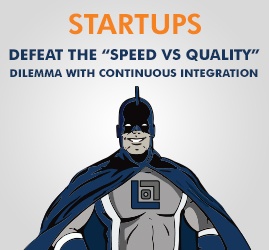
Startups are defined by speed and scrappiness. Think breakneck time to market, lean teams pushing the limit on what can be done in a day and releases that prioritize big, innovative leaps over more gradual, iterative perfection.
On the flip side, most of these teams start small. And many remain small for a long time after their product launch and market success. To keep costs low, startups rely on developers to test the product themselves instead of QA engineers. The theory behind this process is that developers know the code best, so why have anyone else lead the charge on setting up a QA process?
As you can expect, this approach to QA testing is not sustainable as the product grows in success and user count. After all, the stability and quality of the product is integral to company success. Because software testing is imperative for your product business, it pays to invest in QA, be it internal employees or QA outsourcing for startups.
Here’s How To Set up a QA Process
The QA needs of every startup vary greatly. While there’s no set rule on how to structure your development and testing teams, we encourage these best practices for outsourcing QA so that you create a solid software development QA process at your startup.
Not sure where to start? We suggest following this three-step process on how startups can solve their biggest QA problems with a QA process. Consider these three recommendations on how to build strong QA for startups:
-
Identify the Best Startup QA Testing Approach for You
First, choose a software testing methodology that allows your QA team to carry out your software development QA process most effectively. Put more simply, implementing a software testing methodology that elevates your project management style can resolve unexpected issues across testing cycles.
Which software testing methodology is right for your internal team and QA outsourcing for startups? Consider these approaches for your QA process:
- Agile Methodology
In agile methodology, QA teams can manage a project by breaking it down into sequences of short iterations called sprints. The QA team takes into account new testing requirements when planning each sprint stage including planning, requirements analysis and testing. Each sprint ends with a review meeting where team members discuss progress and future testing sprints. Upon each new iteration, the QA team can take into account previous experience in order to reduce risks and increase efficiency.
- Waterfall Methodology
This software development QA process builds on a QA team’s step-by-step progress throughout testing. A QA team first documents and plans the whole project before creating sequential steps for QA testers to follow. In other words, Step 2 cannot be taken until Step 1 is complete.
Many testing teams, including QA outsourcing for startups, choose the waterfall methodology because it is simple and straightforward to implement within the development cycle. Keep in mind that, because of its regimented structure, teams are unable to make quick corrections to the testing process.
- Verification and Validation Methodology (V-Model)
Like the waterfall methodology, this method also takes a step-by-step approach to software testing. What makes it different is that the development process occurs in parallel with the testing process. Once a specific stage of development is complete, startup QA testing begins immediately for that part of the product.
This approach to QA for startups allows teams to make product changes earlier so that time and resources can be reallocated towards future initiatives.
- Incremental Methodology
This software testing process consists of multiple iterations with each of these cycles featuring several parts. Each iteration aims to add product value, such as new features or upgraded quality. Incremental methodology encompasses three stages of design and development, testing and final implementation.
This QA testing approach is flexible, allowing for QA teams to make changes to the testing process seamlessly and in real time.
No matter the testing methodology you choose, your tests should be built upon these four parameters:
- Component or unit tests - To support your development team and their processes.
- Business scenarios - To test the end-to-end business processes, from the customer point of view of your product to the end user’s perspective of using your software application.
- User tests - To test the product from a user’s perspective. These are mostly manual tests, requiring an experienced, full-time QA engineer or QA outsourcing for startups.
- Technical tests - To evaluate the performance, load, and security of the product. These tests focus on the infrastructure and platform of the product by carrying out connectivity testing, performance testing and recovery testing.
- Agile Methodology
-
Gauge the Complexity of Your QA Process
Not all startup QA testing is created equal, nor does it all have the same cost. Many startups cut costs by performing manual testing on areas that have been recently fixed, then proceeding to areas of integration that are connected to, or impacted by, that fix.
Automation adds value to your testing by allowing for quick regression testing throughout all parts of the application that remain unaffected by hotfixes or new code. This requires a dedicated automation engineer, be it an internal hire or QA outsourcing for startups, depending on this size of your budget and the amount of code to be tested before each release.
To fully understand the complexity of your QA process, ask yourself these questions:
- How robust is your tech stack?
- What tools does your team have in place for both manual and automated testing?
- Are these tools configured for optimal testing practices?
- How many tests can be automated?
- How much time is needed to automate each test case?
- How many QA engineers are needed to support this process?
- What is your programming language?
- Is your programming language compatible with your tech stack and API integrations?
- Is your programming language applied consistently throughout your product?
- What is your testing timeline?
- Does your testing schedule maintain a constant cadence over time?
- What factors impact staying on schedule for testing?
- How many environments support the software?
- How accurate are the data sets across environments?
- What are the key differences for testing within each environment?
- How robust is your tech stack?
-
Hire QA at an Opportune Time
When to hire QA for startups depends on your appetite for risk! Recruiting your first paying customer, receiving your first major complaint, seeing big churn with your product - all of these are qualifying reasons to start building your QA team today.
Many startups enjoy the benefits of outsourcing QA when resource constrained. So, how do you know when you need to hire a QA partner?
- Your time to market is down: Your team keeps missing deadlines and pushing back launch dates in order to resolve product defects that could be caught sooner with QA testers.
- You’re integrating new tools and technologies: Because QA testers are not involved in the development of new product features and API integrations, they can offer a fresh perspective by testing the product like a user.
- You’re implementing an Agile methodology: This software development QA process can only be successful when both QA engineers and software developers have a seat at the table.
- You’re receiving poor customer reviews: Poor product quality is often the result of having no QA team. Developers struggle to split their time between developing and testing, impacting product release to market.
Next Steps on How To Set up QA Processes
When it comes to building a QA team, you have plenty of options. If you don’t want to hire a full-time, onsite QA engineer, you can contract the services of a qualified QA partner. If outsourcing QA is the best option for your company, make sure you’re fully examining all your options.
Start with these questions when evaluating the characteristics of your offshore QA team:
- What are their security measures?
- Do they take all the necessary precautions to safeguard your software product and customer data?
- How often do they upgrade their security protocols?
- How much experience do they have in your industry?
- Do they understand industry challenges as well as industry trends?
- Can they integrate with your tech stack?
- Are they skilled in automation testing and your preferred programming language?
- Can they offer feedback on how to optimize your technology and testing tools?
You can simplify your search by partnering with a QA outsourcing services provider like QASource. Our testing engineers have years of experience spanning testing methodologies, programming languages, industries and QA practices. Our team of experts can help your startup set up a QA process that’s efficient and cost-effective. Get in touch with a QASource expert today.






